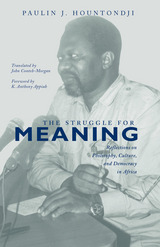2 books about Appiah, K. Anthony

Prejudicial Appearances
The Logic of American Antidiscrimination Law
Robert C. Post, with K. Anthony Appiah, Judith Butler, Thomas C. Grey, and Reva B. Siegel
Duke University Press, 2001
In Prejudicial Appearances noted legal scholar Robert C. Post argues modern American antidiscrimination law should not be conceived as protecting the transcendental dignity of individual persons but instead as transforming social practices that define and sustain potentially oppressive categories like race or gender. Arguing that the prevailing logic of American antidiscrimination law is misleading, Post lobbies for deploying sociological understandings to reevaluate the antidiscrimination project in ways that would render the law more effective and just.
Four distinguished commentators respond to Post’s provocative essay. Each adopts a distinctive perspective. K. Anthony Appiah investigates the philosophical logic of stereotyping and of equality. Questioning whether the law ought to endorse any social practices that define persons, Judith Butler explores the tension between sociological and postmodern approaches to antidiscrimination law. Thomas C. Grey examines whether Post’s proposal can be reconciled with the values of the rule of law. And Reva B. Siegel applies critical race theory to query whether antidiscrimination law’s reshaping of race and gender should best be understood in terms of practices of subordination and stratification.
By illuminating the consequential rhetorical maneuvers at the heart of contemporary U.S. antidiscrimination law, Prejudical Appearances forces readers to reappraise the relationship between courts of law and social behavior. As such, it will enrich scholars interested in the relationships between law, rhetoric, postmodernism, race, and gender.
Four distinguished commentators respond to Post’s provocative essay. Each adopts a distinctive perspective. K. Anthony Appiah investigates the philosophical logic of stereotyping and of equality. Questioning whether the law ought to endorse any social practices that define persons, Judith Butler explores the tension between sociological and postmodern approaches to antidiscrimination law. Thomas C. Grey examines whether Post’s proposal can be reconciled with the values of the rule of law. And Reva B. Siegel applies critical race theory to query whether antidiscrimination law’s reshaping of race and gender should best be understood in terms of practices of subordination and stratification.
By illuminating the consequential rhetorical maneuvers at the heart of contemporary U.S. antidiscrimination law, Prejudical Appearances forces readers to reappraise the relationship between courts of law and social behavior. As such, it will enrich scholars interested in the relationships between law, rhetoric, postmodernism, race, and gender.
[more]

The Struggle For Meaning
Reflections on Philosophy, Culture, and Democracy in Africa
Paulin J. Hountondji
Ohio University Press, 2002
The Struggle for Meaning is a landmark publication by one of African philosophy’s leading figures, Paulin J. Hountondji, best known for his critique of ethnophilosophy in the late 1960s and early 1970s. In this volume, he responds with autobiographical and philosophical reflection to the dialogue and controversy he has provoked. He discusses the ideas, rooted in the work of such thinkers as Husserl and Hountondji’s former teachers Derrida, Althusser, and Ricoeur, that helped shape his critique. Applying his philosophical ideas to the critical issues of democracy, culture, and development in Africa today, he addresses three crucial topics: the nexus between scientific extraversion and economic dependence; the nature of endogenous traditions of thought and their relationship with modern science; and the implications—for political pluralism and democracy—of the emergence of “philosophies of subject” in Africa. While the book’s immediate concern is with Africa, the densely theoretical nature of its analyses, and its bearing on current postmodern theories of the “other,” will make this timely and elegant translation of great interest to many disciplines, especially ethnic, gender, and multicultural studies.
[more]
READERS
Browse our collection.
PUBLISHERS
See BiblioVault's publisher services.
STUDENT SERVICES
Files for college accessibility offices.
UChicago Accessibility Resources
home | accessibility | search | about | contact us
BiblioVault ® 2001 - 2025
The University of Chicago Press









